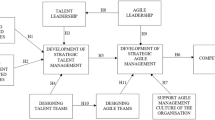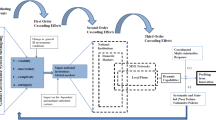Abstract
This cross-cultural research project, involving the United States and Finland, explored how the entrepreneurial firm’s acquisition of business processes’ knowledge from interaction with incubator management positively impacts on new product development, increased technical competence, enhanced reputation and lower costs of sales to customers. In a sample of 52 firms, the study’s methodology depended on single response, self-reported data. The findings suggest that the sole knowledge benefits gained by the firm, from the incubator relationship, is a perception of enhanced reputation. Also, incubator managers should focus more on assisting new technology based firms with growing the venture in the marketplace.
Similar content being viewed by others
References
Aldrich, H. (2000). Organizations evolving. London: Sage Publications.
Aldrich, H. E., & Martinez, M. A. (2001). Many are called, but few are chosen: An evolutionary perspective for the study of entrepreneurship. Entrepreneurship Theory and Practice, 25(4), 41–56.
Allen, D. N., & McCluskey, R. (1990). Structure, policy, services, and performance in the business incubator industry. Entrepreneurship Theory and Practice, 15(2), 61–77.
Barney, J. B. (2002). Gaining and sustaining competitive advantage. Upper Saddle River, NJ: Prentice Hall.
Brown, S. L., & Eisenhardt, K. M. (1995). Product development: Past research, present findings, and future directions. Academy of Management Review, 20, 343.
Burt, R. S. (1997). The contingent value of social capital. Administrative Science Quarterly, 42, 339–365.
Chrisman, J. J., & Leslie, J. (1989). Strategic, administrative, and operating problems: The impact of outsiders on small firm performance. Entrepreneurship Theory and Practice, 13(3), 37–51.
Cohen, W. M., & Levinthal, D. A. (1990). Absorptive capacity: A new perspective on learning and innovation. Administrative Science Quarterly, 35, 128–152.
Gaskill, L. R., VanAuken, H. E., & Manning, R. A. (1993). A factor analytic study of the perceived causes of small business failure. Journal of Small Business Management, 31(4), 18–31.
Hansen, M., Chesbrough, H. W., Nohria, N., & Sull, D. N. (2000). Networked incubators hothouses of the new economy. Harvard Business Review, 78(5), 74–83.
Hitt, M. A., Ireland, R. D., Camp, M., & Sexton, D. L. (2001). Guest editors’ introduction to the special issue strategic entrepreneurship: entrepreneurial strategies for wealth creation. Strategic Management Journal, 22, 479–491.
Innopoli Annual Report (2001). 01/31/2003, http://www.innopoli.fi
Kazanjian, R. K. (1988). Relation of dominant problems to stages of growth in technology-based new ventures. Academy of Management Journal, 31, 257–279.
Kelly, D. J., & Rice, M. P. (2001). Technology-based strategic actions in new firms: The influence of founding technology resources. Entrepreneurship Theory and Practice, 26(1), 55–73.
Kessler, E. H., & Chakrabarti, A. K. (1996). Innovation speed: A conceptual model of context, antecedents, and outcomes. Academy of Management Review, 21, 1143.
Kirchhoff, B. A. (1994). Entrepreneurship and dynamic capitalism: The economics of business firm formation and growth. Westport, Conn.: Praeger.
Lee, C., Miller, W. F., Hancock, M. G., & Rowen, H. S. (2000). The silicon valley edge a habitat for innovation and entrepreneurship. Stanford: Stanford University Press.
Lin, N. (2001). Social capital a theory of social structure and action. Cambridge: Cambridge University Press.
Murphy, G. B., Trailer, J. W., & Hill, R. C. (1996). Measuring performance in entrepreneurship research. Journal of Business Research, 36, 15–23.
National Business Incubator Association Retrieved February 19, 2003, from http://www.nbia.org
Otaniemi Science Park: Innolinko. http://www.otech.fi/eng/innolinko.htm, 02/04/2003.
Otaniemi Science Park: InnoTULI. http://www.otech.fi/eng/innotuli.htm, 02/04/2003.
Parikh, M. (2001). Knowledge management framework for high-tech research and development. Engineering Management Journal, 13(3), 27–33.
Rice, M. P. (1992). Intervention mechanisms used to influence the critical success factors of new ventures: An exploratory study. Troy, NY: Rensselaer Polytechnic Institute.
Rice, M. P. (2002). Co-production of business assistance in business incubators and exploratory study. Journal of Business Venturing, 17, 163–187.
Rice, M., & Matthews, J. B. (1995). Growing new ventures, creating new jobs: Principles & practices of successful business incubation. Westport: Quorum.
Science Park & Innovation Center Retrieved February 19, 2003 http://spica-directory.net
Shane, S., & Stuart, T. (2002). Organizational endowments and the performance of university start-ups. Management Science, 48, 154–170.
Sherman, H. D. (1999). Assessing the intervention effectiveness of business incubation programs on new business start-ups. Journal of Developmental Entrepreneurship, 4(2), 117–133.
Spinno Business Development Centre. http://www.spinno_company.htm, 02/04/2003.
Tekes, National Technology Agency Tekes Annual Review 2001.
Yli-Renko, H. (1999). Dependence, social capital, and learning in key customer relationships effects on the performance of technology-based new firms. Helsinki, Finland: Helsinki University of Technology.
Yli-Renko, H., Autio, E., & Sapienza, H. J. (2001). Social capital, knowledge acquisition, and knowledge exploitation in young technology-based firms. Strategic Management Journal, 22, 587–613.
Zimmerman, M. A., & Zeitz, G. J. (2002). Beyond survival: achieving new venture growth by building legitimacy. Academy of Management Review, 27, 414–431.
Zucker, L. G., Darby, M. R., & Armstrong, J. S. (2002). Commercializing knowledge: University science, knowledge capture, and firm performance in biotechnology. Management Science, 48, 138–153.
Author information
Authors and Affiliations
Corresponding author
Additional information
Funding for this project was provided by The National Science Foundation, and The National Technology Agency of Finland.
Rights and permissions
About this article
Cite this article
Studdard, N.L. The effectiveness of entrepreneurial firm’s knowledge acquisition from a business incubator. Int Entrep Manag J 2, 211–225 (2006). https://doi.org/10.1007/s11365-006-8685-z
Issue Date:
DOI: https://doi.org/10.1007/s11365-006-8685-z




